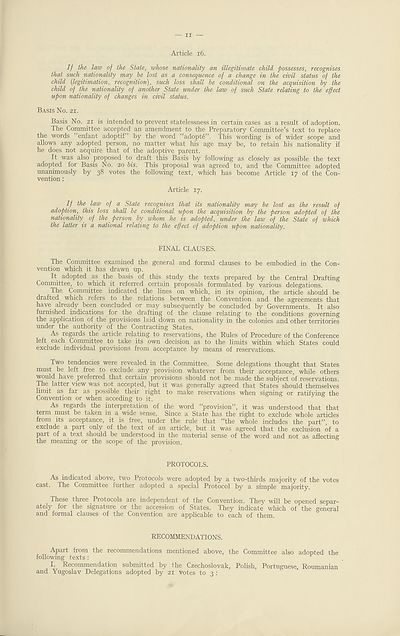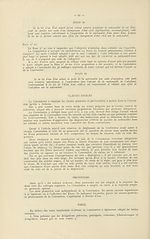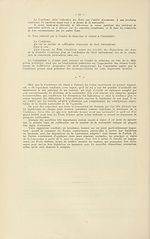Download files
Complete book:
Individual page:
Thumbnail gallery: Grid view | List view

II
Article 16.
If the law of the State, whose nationality an illegitimate child possesses, recognises
that such nationality may be lost as a consequence of a change in the civil status of the
child {legitimation, recognition), such loss shall be conditional on the acquisition by the
child of the nationality of another State under the law of such State relating to the effect
upon nationality of changes in civil status.
Basis No. 21.
Basis No. 21 is intended to prevent statelessness in certain cases as a result of adoption.
The Committee accepted an amendment to the Preparatory Committee’s text to replace
the words enfant adoptif” by the word “adopte”. This wording is of wider scope and
allows any adopted person, no matter what his age may be, to retain his nationality if
he does not acquire that of the adoptive parent.
It was also proposed to draft this Basis by following as closely as possible the text
adopted for Basis No. 20 bis. This proposal was agreed to, and the Committee adopted
unanimously by 38 votes the following text, which has become Article 17 of the Con¬
vention :
Article 17.
If the law of a State recognises that its nationality may be lost as the result of
adoption, this loss shall be conditional upon the acquisition by the person adopted of the
nationality of the person by whom he is adopted, under the law of the State of which
the latter is a national relating to the effect of adoption upon nationality.
FINAL CLAUSES.
The Committee examined the general and formal clauses to be embodied in the Con¬
vention which it has drawn up.
It adopted as the basis of this study the texts prepared by the Central Drafting
Committee, to which it referred certain proposals formulated by various delegations.
The Committee indicated the lines on which, in its opinion, the article should be
drafted which refers to the relations between the Convention and the agreements that
have already been concluded or may subsequently be concluded by Governments. It also
furnished indications for the drafting of the clause relating to the conditions governing
the application of the provisions laid down on nationality in the colonies and other territories
under the authority of the Contracting States.
As regards the article relating to reservations, the Rules of Procedure of the Conference
left each Committee to take its own decision as to the limits within which States could
exclude individual provisions from acceptance by means of reservations.
Two tendencies were revealed in the Committee. Some delegations thought that States
must be left free to exclude any provision whatever from their acceptance, while others
would have preferred that certain provisions should not be made the subject of reservations.
The latter view was not accepted, but it was generally agreed that States should themselves
limit as far as possible their right to make reservations when signing or ratifying the
Convention or when acceding to it.
As regards the interpretation of the word “provision”, it was understood that that
term must be taken in a wide sense. Since a State has the right to exclude whole articles
from its acceptance, it is free, under the rule that “the whole includes the part”, to
exclude a part only of the text of an article, but it was agreed that the exclusion of a
part of a text should be understood in the material sense of the word and not as affecting
the meaning or the scope of the provision.
PROTOCOLS.
As indicated above, two Protocols were adopted by a two-thirds majority of the votes
cast. The Committee further adopted a special Protocol by a simple majority.
These three Protocols are independent of the Convention. They will be opened separ-
ately for the signature or the accession of States. They indicate which of the general
and formal clauses of the Convention are applicable to each of them.
RECOMMENDATIONS.
Apart from the recommendations mentioned above, the Committee also adopted the
following texts :
I. Recommendation submitted by the Czechoslovak, Polish, Portuguese Roumanian
and Yugoslav Delegations adopted by 21 votes to 3 :
Article 16.
If the law of the State, whose nationality an illegitimate child possesses, recognises
that such nationality may be lost as a consequence of a change in the civil status of the
child {legitimation, recognition), such loss shall be conditional on the acquisition by the
child of the nationality of another State under the law of such State relating to the effect
upon nationality of changes in civil status.
Basis No. 21.
Basis No. 21 is intended to prevent statelessness in certain cases as a result of adoption.
The Committee accepted an amendment to the Preparatory Committee’s text to replace
the words enfant adoptif” by the word “adopte”. This wording is of wider scope and
allows any adopted person, no matter what his age may be, to retain his nationality if
he does not acquire that of the adoptive parent.
It was also proposed to draft this Basis by following as closely as possible the text
adopted for Basis No. 20 bis. This proposal was agreed to, and the Committee adopted
unanimously by 38 votes the following text, which has become Article 17 of the Con¬
vention :
Article 17.
If the law of a State recognises that its nationality may be lost as the result of
adoption, this loss shall be conditional upon the acquisition by the person adopted of the
nationality of the person by whom he is adopted, under the law of the State of which
the latter is a national relating to the effect of adoption upon nationality.
FINAL CLAUSES.
The Committee examined the general and formal clauses to be embodied in the Con¬
vention which it has drawn up.
It adopted as the basis of this study the texts prepared by the Central Drafting
Committee, to which it referred certain proposals formulated by various delegations.
The Committee indicated the lines on which, in its opinion, the article should be
drafted which refers to the relations between the Convention and the agreements that
have already been concluded or may subsequently be concluded by Governments. It also
furnished indications for the drafting of the clause relating to the conditions governing
the application of the provisions laid down on nationality in the colonies and other territories
under the authority of the Contracting States.
As regards the article relating to reservations, the Rules of Procedure of the Conference
left each Committee to take its own decision as to the limits within which States could
exclude individual provisions from acceptance by means of reservations.
Two tendencies were revealed in the Committee. Some delegations thought that States
must be left free to exclude any provision whatever from their acceptance, while others
would have preferred that certain provisions should not be made the subject of reservations.
The latter view was not accepted, but it was generally agreed that States should themselves
limit as far as possible their right to make reservations when signing or ratifying the
Convention or when acceding to it.
As regards the interpretation of the word “provision”, it was understood that that
term must be taken in a wide sense. Since a State has the right to exclude whole articles
from its acceptance, it is free, under the rule that “the whole includes the part”, to
exclude a part only of the text of an article, but it was agreed that the exclusion of a
part of a text should be understood in the material sense of the word and not as affecting
the meaning or the scope of the provision.
PROTOCOLS.
As indicated above, two Protocols were adopted by a two-thirds majority of the votes
cast. The Committee further adopted a special Protocol by a simple majority.
These three Protocols are independent of the Convention. They will be opened separ-
ately for the signature or the accession of States. They indicate which of the general
and formal clauses of the Convention are applicable to each of them.
RECOMMENDATIONS.
Apart from the recommendations mentioned above, the Committee also adopted the
following texts :
I. Recommendation submitted by the Czechoslovak, Polish, Portuguese Roumanian
and Yugoslav Delegations adopted by 21 votes to 3 :
Set display mode to:
![]() Universal Viewer |
Universal Viewer | ![]() Mirador |
Large image | Transcription
Mirador |
Large image | Transcription
Images and transcriptions on this page, including medium image downloads, may be used under the Creative Commons Attribution 4.0 International Licence unless otherwise stated. ![]()
| League of Nations > Legal > Rapport de la Première commission (Nationalité) > (21) |
|---|
| Permanent URL | https://digital.nls.uk/191514935 |
|---|
| Shelfmark | LN.V |
|---|
| Description | Over 1,200 documents from the non-political organs of the League of Nations that dealt with health, disarmament, economic and financial matters for the duration of the League (1919-1945). Also online are statistical bulletins, essential facts, and an overview of the League by the first Secretary General, Sir Eric Drummond. These items are part of the Official Publications collection at the National Library of Scotland. |
|---|---|
| Additional NLS resources: |
|

